- Home
- »
- Biotechnology
- »
-
Rat And Mouse Model Market Size And Share Report, 2030GVR Report cover
![Rat And Mouse Model Market Size, Share & Trends Report]()
Rat And Mouse Model Market (2024 - 2030) Size, Share & Trends Analysis Report By Model And Services, By Application (Cardiovascular Diseases, Genetic Diseases), By End-use (Pharmaceutical & Biotechnology Companies), By Region, And Segment Forecasts
- Report ID: GVR-4-68039-668-0
- Number of Report Pages: 130
- Format: PDF
- Historical Range: 2018 - 2022
- Forecast Period: 2024 - 2030
- Industry: Healthcare
- Report Summary
- Table of Contents
- Segmentation
- Methodology
- Download FREE Sample
-
Download Sample Report
Rat And Mouse Model Market Summary
The global rat and mouse model market size was estimated at USD 1.98 billion in 2023 and is projected to reach USD 3.58 billion by 2030, growing at a CAGR of 9.0% from 2024 to 2030. The increased demand for genetically altered models to aid researchers in finding and validating pharmaceutical targets is propelling this market forward.
Key Market Trends & Insights
- The North America dominated the market and accounted for 49.1% share in 2023.
- The Asia Pacific is anticipated to witness significant growth in the market from 2024 to 2030.
- Based on end-use, the pharmaceutical & biotechnology companies segment dominated the market in 2023.
- Based on model and services, the model segment led the market and accounted for 88.6% of the global revenue in 2023.
- Based on application, the cancer segment accounted for the largest market revenue share in 2023.
Market Size & Forecast
- 2023 Market Size: USD 1.98 Billion
- 2030 Projected Market USD 3.58 Billion
- CAGR (2024-2030): 9.0%
- North America: Largest market in 2023
Rising R&D expenditures in the pharmaceutical and biotechnology sectors are also predicted to boost market growth.
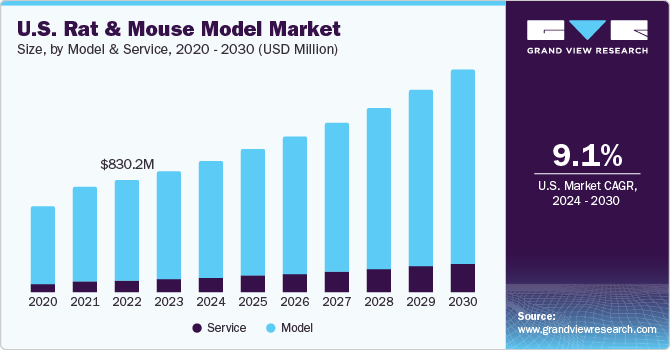
The COVID-19 pandemic has created abundant opportunities for the market players. In September 2021, GemPharmatech Co., Ltd. (GPT) participated in the Biologics UK Oxford Global Conference to represent its humanized mouse models to assist the COVID-19 preclinical development. Furthermore, the rise in demand for humanized ACE2 (hACE2) mouse models to study the pathogenesis of SARS-CoV-2 propels market growth. Several key players are focused on producing animal prototypes that can aid in COVID-19 research. For instance, Applied StemCell, Inc., a U.S.-based biotechnology company, has used its TARGAT knockin technology to develop hACE2 models to assess the efficacy of vaccines and antiviral drugs and evaluate the severity of COVID-19 pathogenesis.
The growing usage of rat & mouse models for precision medicine and pharmacological methods predicts the rise of the rat & mouse model market. Furthermore, with the increasing acceptance of rodent models, the adoption and demand for rat and mouse models are expected to expand during the forecast period. However, ethical concerns over the use of animals in research operations are expected to hinder market expansion to some extent over the forecast period.
The growth of personalized medicine boosts the demand for humanized rat and mouse models across the globe. Industry participants are developing rat and mouse prototypes for personalized treatments and medicine. For instance, in July 2020, a team from Institut d’Investigació Biomèdica de Bellvitge (IDIBELL) and ICO utilized a mouse orthotopic model to perform a real-time personalized oncology study aimed at determining the best therapeutic option for treating a type of relapse sarcoma. Such studies and trials focused on the use of mouse and rat models for personalized medicine are anticipated to drive the market growth in the coming years.
Market Concentration & Characteristics
Market growth stage is high, and pace of the market growth is accelerating. The rat & mouse model market is characterized by a high degree of innovation owing to the rapid technological advancements driven by factors such as the use of CRISPR/Cas9* genome editing and the generation of genetically modified mouse.
The market is also characterized by a high level of merger and acquisition (M&A) activity undertaken by the leading players. This is due to several factors, including the desire to gain access to novel prototypes, the rising focus on increasing the company’s products & services portfolio, the need to consolidate in a rapidly growing market, and the increasing strategic importance of animal models. Several companies are undertaking this strategy to strengthen their portfolio. For instance, in October 2021, the Jackson Laboratory, a biomedical research institution, acquired Charles River Laboratories Japan’s Research Models & Services (RMS) business.
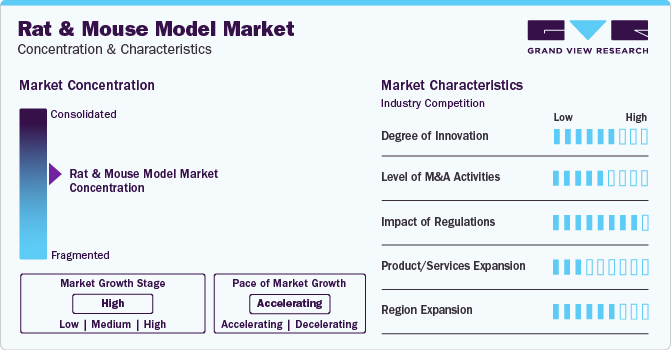
The rat and mouse model market is also subject to increasing regulatory scrutiny. Several regulatory and government authorities are focusing on scrutinizing animal models. Many countries have established policies, laws, regulations, and guidelines to ensure the ethical and humane care of animals used in research. These regulations must be adhered to by scientists and laboratory clinicians involved in animal use, care, and production in laboratories.
Several companies are expanding their rat and mouse-based services and products. Thus, the product or service expansion in this industry is significant. Companies are including novel models for various diseases in their portfolio. For instance, Hera Biolabs offers SRG Rats that can demonstrate enhanced engraftment efficiencies, tumor growth, size, and tumor morphology across several patient-derived tissues and human cancer cell lines.
End-use Insights
The pharmaceutical & biotechnology companies segment dominated the market in 2023. Increased use of the rat and mouse models in the development of vaccines for infectious diseases is likely to drive the segment even further during the forecast period. Mice are widely employed as model organisms to evaluate vaccine candidates because they have a well-defined genome, a well-characterized immune system, & the ability to reproduce quickly. Moreover, the emergence of mice models that can generate a human version of ACE2 has enhanced their use in COVID-19 research in pharmaceutical and biotechnology businesses. Furthermore, the increased collaboration between biotechnology businesses and academic institutions to develop COVID-19 vaccines improves revenue generation.
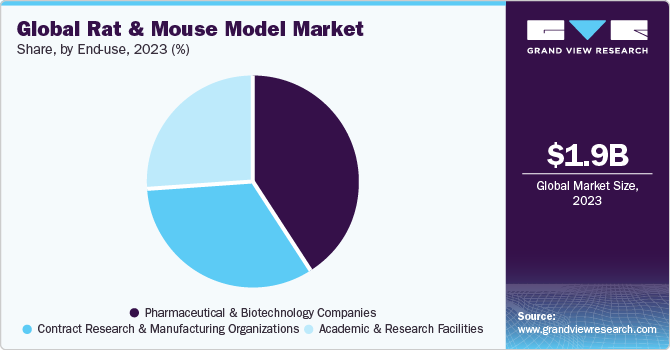
The contract research and manufacturing organization segment is expected to witness the fastest growth during the forecast period. Due to time and expense constraints, the demand for outsourcing operations and increased investment in R&D projects are significant factors expected to fuel market expansion in the coming years. Contract research outsourcing collaboration provides cutting-edge services; therefore, government agencies prefer to grant projects to contract research organizations, boosting industry growth. For instance, in April 2022, Taconic Biosciences, one of the leaders in offering drug discovery animal model solutions, along with Biomodels, a provider of contract research services for early-stage drug development, have joined forces to launch the Taconic-Biomodels Microbiome Initiative (TBMI), which will provide investigators with effortless access for carrying out germ-free as well as gnotobiotic microbiome research solutions, from design to data. By integrating access to pertinent disease models, germ-free animal production, & downstream in vivo study design, execution, and analytics, the TBMI overcomes the barriers that have previously impeded microbiome research activities.
Model And Services Insights
The model segment led the market and accounted for 88.6% of the global revenue in 2023. This high percentage can be attributed to the availability of various types of models, such as outbred and inbred, which are further available in knockout and knock-in models. Furthermore, these models can accurately represent the genomic structure of humans and hence are employed in research involving human subjects. Companies like Charles River Laboratories offer numerous types of outbred rat models to help researchers understand how certain genetic variations contribute to the disorder. Thus, the presence of several companies like Charles River Laboratories, Cyagen, Hera Biolabs, and genOway providing the rats and mouse models is anticipated to boost the segment demand in the coming years.
The services segment is expected to register the fastest CAGR over the forecast period. Industry participants are focusing on numerous services like cryopreservation, breeding, rederivation, genetic testing, quarantine, and others to ensure the availability of healthy and genetically stable animal models. Moreover, these services offer various benefits in biotechnology, genomics, and pharmaceutical research. For instance, cryopreservation services offered by key companies, such as Charles River Laboratories, help protect animal lines in case of natural disaster, a catastrophic accident, microbial contamination, and alteration of gene expression in later generations. The service also prevents loss of phenotype, limits genetic drift, and ensures easy recovery of VAF/Elite rats and mice. Such advances associated with these services are expected to boost the segment growth over the forecast period.
Regional Insights
North America dominated the market and accounted for 49.1% share in 2023. This high share is attributable to the presence of key market players and the growth in pharmaceutical as well as research sectors in this region. Furthermore, companies operating in the region are expanding their presence in various areas. For instance, in February 2021, GemPharmatech (GPT) Co., Ltd. established new operations in California and Massachusetts to house more than 6000 mouse models. Such expansions across the major countries like the U,S is anticipated to propel the regional market expansion.
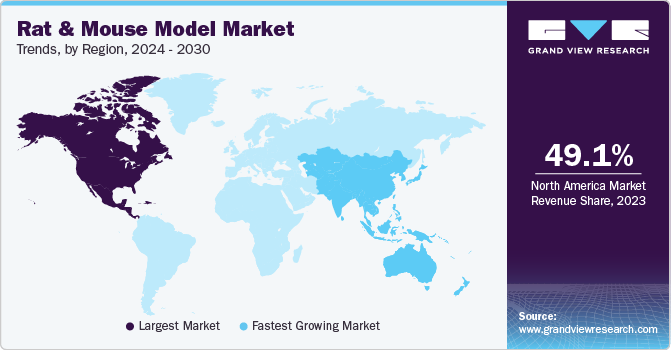
Asia Pacific is anticipated to witness significant growth in the market from 2024 to 2030. This growth can be attributed to the mandatory testing on animals for all cosmetics and pharmaceutical products in China, increasing private and public investment in China's life sciences industry, and increasing biomedical along with medical research and regenerative medical research in Japan. Furthermore, the expansion of India's biomedical industry and the establishment of bio-clusters to support India's biotechnology industry are propelling the Asia Pacific market. Moreover, companies are expanding their presence in several Asia Pacific countries. For instance, in November 2020, Beijing Biocytogen Co., Ltd. partnered with Ina Research Co., Ltd. to expand its business in the Japanese market. Under this collaboration, Biocytogen will offer its innovative animal models to Japanese customers. Such factors are fueling the expansion of the market across the region.
Application Insights
Based on application, the market is segmented into cardiovascular diseases, genetic diseases, cancer, infectious diseases, transplantation, and others. The cancer segment accounted for the largest market revenue share in 2023. This is attributable to the growing use of animal models in cancer research and studies. Moreover, several industry participants show animal models' utility in cancer research. For instance, the Fusion Conference on Animal Models of Cancer was held in July 2023. This conference demonstrated how pre-clinical mouse models can be utilized to study the cellular and molecular mechanisms involved in cancer progression, initiation, and metastasis in living organisms. Such industry events can increase awareness about animal models and their use in the field of cancer research is anticipated to drive the segment demand over the forecast period.
The genetic diseases segment is expected to register the fastest CAGR during the forecast period. Animal models, like mouse models, are increasingly used in genetic disease research for several reasons, including their biological similarity to humans, their ability to inbred to yield genetically similar strains, and they can be genetically manipulated to mimic virtually any human condition or disease. Furthermore, numerous industry players are developing these animal models to study genetic diseases. For instance, in May 2023, researchers from the University Hospital Carl Gustav Carus in Germany developed mice with a defective human gene accountable for a rare genetic disorder called congenital adrenal hyperplasia (CAH). Such developments in the animal models for studying genetic and rare disorders are anticipated to drive the segment growth over the forecast period.
Key Companies & Market Share Insights
-
Some of the key players operating in the market include Charles River Laboratories, The Jackson Laboratory, Cyagen, genOway, Inotiv, Janvier Labs, Taconic Biosciences, Inc., and Biomedical Research Models (Biomere),
-
The Jackson Laboratory has been operating in the industry for more than 80 years. It provides a wide range of mice and services, including custom model generation, colony management, and surgical & preconditioning services. It also provides different types of models for various applications in research activities based on numerous strains like immunodeficient, inbred, outbred, hybrid, mutant, and cre strains.
-
genOway, a major biotechnology company, operates in 28 countries across five continents and provides customized mouse and rat models of various types like constitutive knockouts, conditional knockouts, and humanized knock-ins, among others.
-
Hera Biolabs, Kind Lab, and Ozgene Pty Ltd. are some of the emerging market participants in the market.
-
Kind Lab offers around 15 to 20 types of rat models from its SIDB Edinburgh and Banglore sites.
-
Ozgene Pty Ltd provides four types of mouse models and additional services, including breeding & husbandry, validation & phenotyping, Geneoz VMS, and goGermline embryo services for
Key Rat And Mouse Model Companies:
- Charles River Laboratories
- The Jackson Laboratory
- Cyagen
- genOway
- Inotiv
- Janvier Labs
- Taconic Biosciences, Inc.
- Biomedical Research Models (Biomere)
- Hera Biolabs
- Kind Lab
- Ozgene Pty Ltd
Recent Developments
-
In May 2023, Taconic Biosciences, a major leader in biotechnology and provider of various types of mice models, introduced a new model in the FcResolv NOG Portfolio that supports the long-term engraftment of human lymphoid cells.
-
In February 2023, Ozgene, a provider of genetically customized mice to researchers, was selected by the Animal Resources Centre (ARC) to assume its operations in Australia. With this initiative, Oszene will provide mouse and rat lines in western Australia.
-
In November 2022, Inotiv, a major CRO offering research services and discovery and development solutions, consolidated its two sites, Indianapolis and Indiana, in the U.S. The company undertook these initiatives to integrate its Research models and services (RMS) business and site optimization strategy.
Rat And Mouse Model Market Report Scope
Report Attribute
Details
Market size value in 2024
USD 2.13 billion
Revenue forecast in 2030
USD 3.58 billion
Growth Rate
CAGR of 9.0% from 2024 to 2030
Base year for estimation
2023
Historical data
2018 - 2022
Forecast period
2024 - 2030
Quantitative units
Revenue in USD billion and CAGR from 2024 to 2030
Report coverage
Revenue forecast, company ranking, competitive landscape, growth factors, and trends
Segments covered
Model and service, application, end-use, region
Regional scope
North America; Europe; Asia Pacific; Latin America; Middle East & Africa
Country scope
U.S.; Canada; Germany; UK; France; Italy; Spain; Denmark; Sweden; Norway; China; Japan; India; South Korea; Australia; Thailand; Brazil; Mexico, Argentina; South Africa; Saudi Arabia, UAE; Kuwait
Key companies profiled
Charles River Laboratories; The Jackson Laboratory; Cyagen; genOway; Inotiv; Janvier Labs; Taconic Biosciences, Inc.; Biomedical Research Models (Biomere); Hera Biolabs; Kind Lab; Ozgene Pty Ltd
Customization scope
Free report customization (equivalent up to 8 analysts working days) with purchase. Addition or alteration to country, regional & segment scope.
Pricing and purchase options
Avail customized purchase options to meet your exact research needs. Explore purchase options
Global Rat And Mouse Model Market Report Segmentation
This report forecasts revenue growth at global, regional, and country levels and provides an analysis of the latest industry trends in each of the sub-segments from 2018 to 2030. For this study, Grand View Research has segmented the global rat and mouse model market report based on model and service, application, end-use, and region.
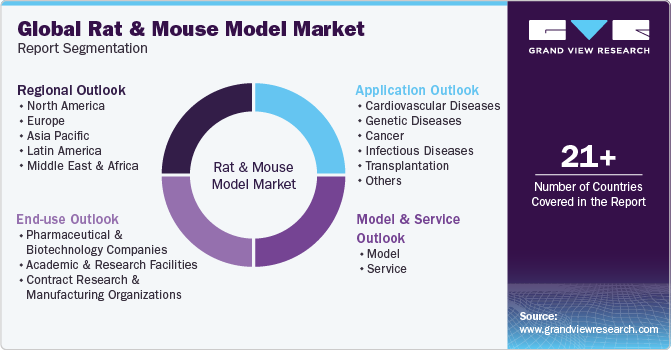
-
Model and Service Outlook (Revenue, USD Billion, 2018 - 2030)
-
Model
-
Inbred
-
Knockout
-
Knock-in
-
Others
-
-
Outbred
-
Knockout
-
Knock-in
-
Others
-
-
-
Service
-
Cryopreservation
-
Breeding
-
Rederivation
-
Genetic testing
-
Quarantine depending
-
Others
-
-
-
Application Outlook (Revenue, USD Billion, 2018 - 2030)
-
Cardiovascular diseases
-
Genetic diseases
-
Cancer
-
Infectious diseases
-
COVID-19
-
Others
-
-
Transplantation
-
Others
-
-
End-use Outlook (Revenue, USD Billion, 2018 - 2030)
-
Pharmaceutical & Biotechnology companies
-
Academic and research facilities
-
Contract research & manufacturing organizations
-
-
Regional Outlook (Revenue, USD Billion, 2018 - 2030)
-
North America
-
U.S.
-
Canada
-
-
Europe
-
Germany
-
U.K.
-
France
-
Italy
-
Spain
-
Denmark
-
Sweden
-
Norway
-
-
Asia Pacific
-
China
-
Japan
-
India
-
South Korea
-
Australia
-
Thailand
-
-
Latin America
-
Brazil
-
Mexico
-
Argentina
-
-
Middle East & Africa
-
South Africa
-
Saudi Arabia
-
UAE
-
Kuwait
-
-
Frequently Asked Questions About This Report
b. The global rat and mouse model market size was estimated at USD 1.98 billion in 2023 and is expected to reach USD 2.13 billion in 2024.
b. The global rat and mouse model market is expected to grow at a compound annual growth rate of 9.0% from 2024 to 2030 to reach USD 3.58 billion by 2030.
b. North America accounted for the highest share of 49.07% in 2023. This is attributed to the presence of key market players and the growth in pharmaceutical as well as research sectors in this region.
b. Some key players operating in the rat and mouse model market include Charles River Laboratories International, Inc.; The Jackson Laboratory; Laboratory Corporation of America Holdings (Covance); Perkin Elmer (Horizon Discovery Group plc); genOway; Envigo; JANVIER LABS; Taconic Biosciences Inc.; Biomedical Research Models (Biomere); Transpogen Biopharmaceutical, Inc.
b. Key factors that are driving the rat and mouse model market growth include rise in adoption of personalized medicine and subsequent demand of rat & mouse models for precision medicine approaches, application of genome editing tools for generation of rodent models, increase in the number of research activities involving the use of rat and mouse models, and grants & investments.
Share this report with your colleague or friend.
Need a Tailored Report?
Customize this report to your needs — add regions, segments, or data points, with 20% free customization.

ISO 9001:2015 & 27001:2022 Certified
We are GDPR and CCPA compliant! Your transaction & personal information is safe and secure. For more details, please read our privacy policy.
Trusted market insights - try a free sample
See how our reports are structured and why industry leaders rely on Grand View Research. Get a free sample or ask us to tailor this report to your needs.










